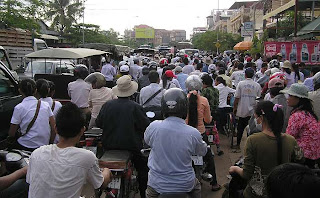My initial reaction to hearing this assessment of the Phnom Penh traffic was to laugh and add “and goes ‘bump’ very hard”. But over time I must say “flowing like water” is the reality of how it works. The key is learning to merge, give way to the bigger vehicle, and follow the ‘actual’ road rules not the theoretical ones.
The best preparation for taking the plunge into the traffic here was the time I spent on the boys gaming console playing the game “Need for Speed: Most Wanted”. Little did I know that learning to drive on the wrong side of the road facing oncoming traffic would be a useful skill here in Phnom Penh. Dodging other traffic is one of the major skills needed to navigate the roadways.
The “flows like water” bit happens when, for example, turning left to join the traffic (which mostly uses the right side) one never stops, but rather kind of merges and mingles against the oncoming traffic until the “waters part” and a way opens up to make it across the traffic and then requires a similar merge into the stream of traffic heading left.
Confused? Perhaps this will help. There are officially two lanes of traffic with all vehicles driving on the right-hand side as in North America and Europe. So as you are driving looking forward there is the oncoming traffic on your left. Got it so far? Ok, this is where it gets tricky, there is another lane of oncoming traffic further to your right which represents the vehicles, mostly motorbikes but actually all vehicles smaller than trucks, that are trying to merge through your line of traffic to join the traffic to your left. Still with me? It is this right hand lane that does the “need for speed” thing and kind of cuts through your lane to merge with the other stream.
This is the basic ‘level 1’ context of the game and has ‘regular’ traffic – cars (some), motor scooters (lots), trucks and bicycles (lots too).
But lets play level two – this adds tuk-tuks (motor scooters pulling a carriage that comfortably seats 4 and often seats 8-10), tri-shaws (peddle powered single seated three wheeled vehicles), rubbish collectors pushing hand propelled carts around, and bicycles or scooters converted into hot food stalls fueled by hot coals.
Level three adds scooters converted to carry 44-gallon drums of flammable liquid, sheets of glass, pieces of angle iron 4-5 metres long, cupboards, double bed mattresses, and then inserts old people from the country side that are visiting the city for the first time and who randomly cross the road along the way.
Level four is the highest level and is the last test. It adds in teenagers who speed, weave in and out of the traffic, and generally create havoc by riding 3 or 4 abreast while chatting to each other. And then the last challenge - the people with mobile phones held to their ears or texting as they go along at half speed.
So watch out for the game “Need for Speed: Flows like water” at a retail store near you – $69.99. Or go down to the local market and get a pirated version for $2!




